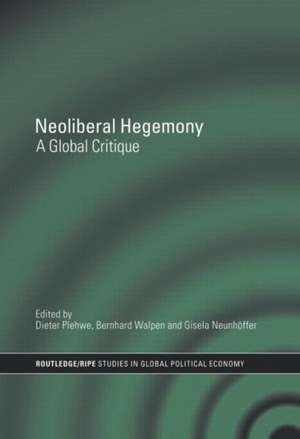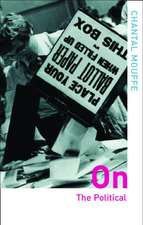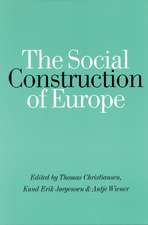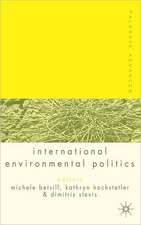Neoliberal Hegemony: A Global Critique: RIPE Series in Global Political Economy
Editat de Dieter Plehwe, Bernhard J. A Walpen, Gisela Neunhöfferen Limba Engleză Paperback – 22 oct 2007
This is the first explanation of neoliberal hegemony, which systematically considers and analyzes the networks and organizations of around 1.000 self conscious neoliberal intellectuals organized in the Mont Pèlerin Society.
This book challenges simplistic understandings of neoliberalism. It underlines the variety of neoliberal schools of thought, the various approaches of its proponents in the fight for hegemony in research and policy development, political and communication efforts, and the well funded, well coordinated, and highly effective new types of knowledge organizations generated by the neoliberal movement: partisan think tanks.
It also closes an important gap in the growing literature on "private authority’’, presenting new perspectives on transnational civil society formation processes.
This fascinating new book will be of great interest to students of international relations, political economy, globalization and politics.
| Toate formatele și edițiile | Preț | Express |
|---|---|---|
| Paperback (1) | 487.86 lei 6-8 săpt. | |
| Taylor & Francis – 22 oct 2007 | 487.86 lei 6-8 săpt. | |
| Hardback (1) | 769.37 lei 6-8 săpt. | |
| Taylor & Francis – 8 dec 2005 | 769.37 lei 6-8 săpt. |
Din seria RIPE Series in Global Political Economy
-
 Preț: 310.75 lei
Preț: 310.75 lei -
 Preț: 280.02 lei
Preț: 280.02 lei -
 Preț: 281.27 lei
Preț: 281.27 lei -
 Preț: 310.01 lei
Preț: 310.01 lei -
 Preț: 390.13 lei
Preț: 390.13 lei -
 Preț: 288.81 lei
Preț: 288.81 lei - 26%
 Preț: 820.21 lei
Preț: 820.21 lei - 18%
 Preț: 700.75 lei
Preț: 700.75 lei -
 Preț: 386.55 lei
Preț: 386.55 lei -
 Preț: 470.90 lei
Preț: 470.90 lei - 18%
 Preț: 999.82 lei
Preț: 999.82 lei - 18%
 Preț: 1054.97 lei
Preț: 1054.97 lei - 18%
 Preț: 1057.40 lei
Preț: 1057.40 lei - 18%
 Preț: 1055.60 lei
Preț: 1055.60 lei - 18%
 Preț: 1053.16 lei
Preț: 1053.16 lei -
 Preț: 362.26 lei
Preț: 362.26 lei -
 Preț: 456.16 lei
Preț: 456.16 lei - 18%
 Preț: 1058.79 lei
Preț: 1058.79 lei - 18%
 Preț: 1057.89 lei
Preț: 1057.89 lei - 26%
 Preț: 822.54 lei
Preț: 822.54 lei -
 Preț: 278.75 lei
Preț: 278.75 lei - 18%
 Preț: 1056.47 lei
Preț: 1056.47 lei - 18%
 Preț: 1057.89 lei
Preț: 1057.89 lei - 18%
 Preț: 1054.89 lei
Preț: 1054.89 lei -
 Preț: 453.96 lei
Preț: 453.96 lei -
 Preț: 411.42 lei
Preț: 411.42 lei -
 Preț: 428.67 lei
Preț: 428.67 lei - 26%
 Preț: 821.53 lei
Preț: 821.53 lei -
 Preț: 353.94 lei
Preț: 353.94 lei - 26%
 Preț: 846.78 lei
Preț: 846.78 lei - 31%
 Preț: 766.24 lei
Preț: 766.24 lei - 18%
 Preț: 1058.43 lei
Preț: 1058.43 lei - 15%
 Preț: 425.07 lei
Preț: 425.07 lei - 18%
 Preț: 696.82 lei
Preț: 696.82 lei -
 Preț: 395.16 lei
Preț: 395.16 lei - 18%
 Preț: 700.31 lei
Preț: 700.31 lei - 18%
 Preț: 1004.20 lei
Preț: 1004.20 lei -
 Preț: 465.69 lei
Preț: 465.69 lei - 15%
 Preț: 672.40 lei
Preț: 672.40 lei - 18%
 Preț: 1016.52 lei
Preț: 1016.52 lei - 18%
 Preț: 1115.21 lei
Preț: 1115.21 lei -
 Preț: 485.07 lei
Preț: 485.07 lei
Preț: 487.86 lei
Nou
Puncte Express: 732
Preț estimativ în valută:
93.36€ • 97.11$ • 77.08£
93.36€ • 97.11$ • 77.08£
Carte tipărită la comandă
Livrare economică 14-28 aprilie
Preluare comenzi: 021 569.72.76
Specificații
ISBN-13: 9780415460033
ISBN-10: 0415460034
Pagini: 312
Ilustrații: 14 tables and 8 line drawings
Dimensiuni: 156 x 234 x 20 mm
Greutate: 0.42 kg
Ediția:1
Editura: Taylor & Francis
Colecția Routledge
Seria RIPE Series in Global Political Economy
Locul publicării:Oxford, United Kingdom
ISBN-10: 0415460034
Pagini: 312
Ilustrații: 14 tables and 8 line drawings
Dimensiuni: 156 x 234 x 20 mm
Greutate: 0.42 kg
Ediția:1
Editura: Taylor & Francis
Colecția Routledge
Seria RIPE Series in Global Political Economy
Locul publicării:Oxford, United Kingdom
Public țintă
Postgraduate and UndergraduateCuprins
Introduction: Reconsidering Neoliberal Hegemony Dieter 1. Global Neoliberal Projects Between Network and Complex Organization: The Making of Neoliberal Knowledge and Hegemony Neoliberalism, Capitalist Class Formation and the Global Network of Corporations and Policy Groups Peddling Reform: The Role of Think Tanks in Shaping the Neoliberal Policy Agenda for the World Bank and International Monetary Fund 2. Neoliberal Hegemonic Constellations in the (Semi-)Periphery: Transnational and domestic roots Why Is There No Third Way? The Role of Neoliberal Ideology, Networks and Think Tanks in Combating Market Socialism and Shaping Transformation in Poland The Neo-Liberal Ascendancy and East Asia: Geo-Politics, Development Theory and the End of the Authoritarian Developmental State in South Korea The Mexican Economy since NAFTA: Socioeconomic Integration or Disintegration? 3. Neoliberal Discourse Relations: Dissemination, diffusion, and adaptation The Great Lie: Markets, Freedom and Knowledge Frontiers and Dystopias: Libertarian Ideology in Science Fiction The Education of Neoliberalism Gender Mainstreaming: Integrating Women into a Neoliberal Europe? 4. Major Hegemonic Battle Lines Neo-Liberalism and Communitarianism: Social Conditions, Discourses and Politics Neo-Liberalism and Cultural Nationalism: A Danse Macabre The World Wide Web of Anti-Neoliberalism Emerging Forms of Post-Fordist Protest and the Impossibility of Global Keynesianism Notes References Index
Notă biografică
Bernhard J. A. Walpen, Dieter Plehwe, Gisela Neunhöffer
Descriere
This is the first explanation of neoliberal hegemony, which systematically considers and analyzes the networks and organizations of around 1,000 self-conscious neoliberal intellectuals organized in the Mont Pèlerin Society.
















